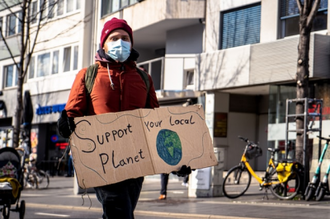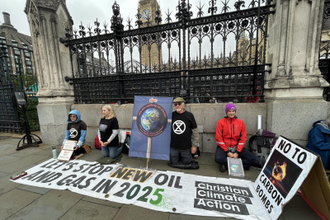Trocaire says latest devastating IPCC Report must be a 'clarion call' for urgent global action

Photo by Mika Baumeister on Unsplash
Source: Trócaire
The stark IPCC report must be a "clarion call" for all rich nations to finally take urgent action to protect the planet from the further unthinkable devastation that will be caused by climate change, Trócaire said today.
The Irish development agency said the report paints a graphic picture of increasing emissions and the wide gap between climate pledges and action which are impacting millions of vulnerable communities around the globe.
Trócaire CEO, Caoimhe de Barra, said the report comes at a time when the world is "sliding backwards" on its climate commitments, adding that during this time of converging crises countries must urgently reconsider their ill-advised reliance on fossil fuels, particularly in light of the Ukraine war which has pushed already high energy prices to record levels.
She appealed to world leaders to take heed, saying there is still a window of opportunity to avoid the worst impacts of the climate crisis. But she warned that this window is closing fast, with climate change impacting most on the poorest in the world, particularly women.
"There are no two ways about it. A phase out of fossil fuels must begin now, not in 10 years' time. It is crystal clear that if we continue on this path, the impacts will be catastrophic and will be seen in a massive loss of lives and livelihoods, mass displacement of communities, and a further breakdown in biodiversity, ecosystems and food security."
Ms de Barra said the Global South is bearing the brunt of climate impacts, including droughts, floods, famines, storms, sea level rise and death. Even though it contributes least to climate change the global south suffers more than 90% of its impacts, and 98% of the deaths associated with climate breakdown.
Climate extremes are causing widespread food and water shortages. In Somalia, 4.3 million people are now severely affected by the ongoing drought and are in dire need of humanitarian assistance.
"This report makes clear that the richest nations have not taken adequate climate mitigation actions in time. The world's richest 10% are responsible for nearly half of all emissions, while the world's poorest account for just 12%. Countries in the Global North must now step up to support a fair and fast transition to renewable energy, phase-out fossil fuel subsidies, infrastructure and production, while increasing climate finance flows to poorer countries."
"Increasing support to the poorest countries to enable them to take action is not only a moral imperative and a political and legal obligation under the Paris Agreement but it is also a practical necessity if global climate goals are to be achieved."
Ms de Barra added that climate justice and human rights must be at the heart of climate action and Ireland needs to adopt a much stronger leadership role at EU and International level to support these changes.
"Developed countries have a responsibility not only to dramatically reduce their own greenhouse gas emissions, but also to provide financing for adaptation efforts in the South and to provide finance to deal with loss and damage."
Ms de Barra also said that developed countries such as Ireland and other EU member states have an obligation to make greater efforts at mitigation on the grounds of their current high emissions per capita, historical emissions, higher incomes, and capacities.
"When you consider the fact that just 100 companies, including the largest oil, coal and gas companies, are responsible for 70% of all global carbon emissions to date, it is clear that we cannot address the climate crisis without also addressing the issue of corporate accountability."
The main findings of the report are:
- Greenhouse gas emissions have risen 12% since 2010; 54 % since 1990; and are now higher than at any point in human history. Without immediate and deep emissions reductions, limiting global warming to 1.5°C is beyond reach.
- The evidence is clear: the time for action is now. The IPCC report states it is possible to halve emissions by 2030.
- "Climate change is the result of more than a century of unsustainable energy and land use, lifestyles and patterns of consumption and production," said IPCC Working Group III Co-Chair Jim Skea Skea. "This report shows how taking action now can move us towards a fairer, more sustainable world".
- In the scenarios assessed by the IPCC, limiting warming to around 1.5°C (2.7°F) requires global greenhouse gas emissions to peak before 2025 at the latest, and be reduced by 43% by 2030; at the same time, methane would also need to be reduced by about a third. Even if these targets are met, it is almost inevitable that we will temporarily exceed this temperature threshold but could return to below it by the end of the century.
- Limiting global warming will require major transitions in the energy sector. This will involve a substantial reduction in fossil fuel use, widespread electrification, improved energy efficiency, and use of alternative fuels (such as hydrogen).
- The report notes that while financial flows are a currently at a factor of three to six times lower than levels needed by 2030 to limit warming to below 2°C (3.6°F), However, clear signalling from governments and the international community, including a stronger alignment of public sector finance and policy could see these investment gaps being closed.
- Accelerated and equitable climate action in mitigating and adapting to climate change impacts is critical to sustainable development. Some response options can absorb and store carbon and, at the same time, help communities limit the impacts associated with climate change. For example, in cities, networks of parks and open spaces, wetlands and urban agriculture can reduce flood risk and reduce heat-island effects.
Learn more why Climate Justice is critical HERE


















